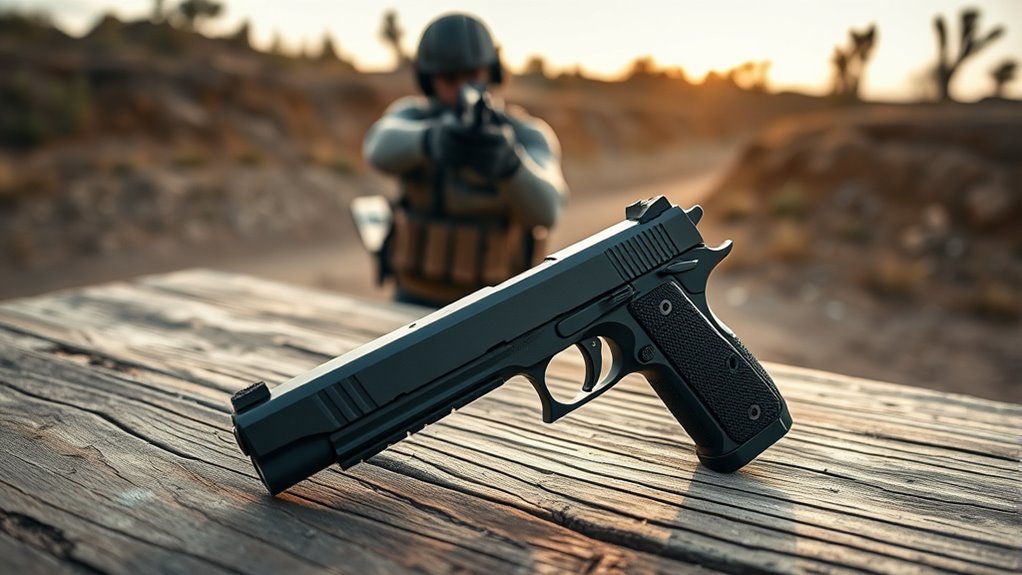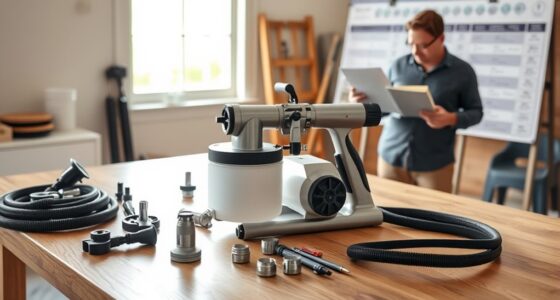Deciding between a single or two-gun setup depends on your needs, skill level, and environment. If you want simplicity, easier handling, and portability, a single firearm works best. However, if flexibility, versatility, and preparedness for different situations matter more, a two-gun system offers advantages. Consider your experience and what scenarios you’ll face most often. To make the right choice and maximize your capabilities, explore more about each option’s benefits and challenges.
Key Takeaways
- Single-gun setups are simpler, lighter, and easier to handle, ideal for beginners and straightforward applications like home defense.
- Two-gun configurations offer increased versatility, allowing quick adaptation to different scenarios or targets.
- Consider your environment and purpose; carry weight and mobility are critical factors in choosing between the two options.
- Two-gun systems require more skill, maintenance, and coordination, which may not suit users seeking simplicity.
- Your experience level and specific needs will determine whether the added flexibility of two guns is necessary.

When choosing between single and two-gun capability, understanding their core differences is essential for making an informed decision. Single-gun setups typically involve a firearm designed for one primary purpose, like a standard rifle or pistol. They’re straightforward, often lighter, and easier to handle, making them ideal for beginners or those seeking simplicity. Two-gun configurations, on the other hand, generally mean carrying or operating two firearms simultaneously or having a dual-function system. This setup can provide versatility and increased firepower but also introduces complexity, weight, and the need for additional training.
Single-gun setups prioritize simplicity and ease of use, while two-gun systems offer versatility and added complexity.
If you’re considering a single gun, you might appreciate its ease of use and lower maintenance. It’s easier to learn, especially if you’re new to firearms, because you only need to focus on mastering one weapon. Single-gun systems tend to be more reliable due to fewer moving parts and less complexity. They’re also more discreet and lighter, which can be vital if you’re carrying for extended periods or need a low-profile option. For home defense or recreational shooting, a single firearm often suffices, especially when combined with proper training and familiarization. Moreover, managing ammunition is simpler with a single gun, reducing the chance of mishandling or running out unexpectedly.
Choosing a two-gun setup can be advantageous if you want flexibility in various scenarios. For example, carrying a pistol and a shotgun or rifle gives you options for different distances or targets. You might prefer this if you’re into tactical training, hunting, or competitive shooting, where the ability to switch between firearms quickly can make a difference. However, managing two guns requires more skill, coordination, and practice. You’ll need to become proficient in handling both weapons smoothly, especially if you intend to use them in high-pressure situations.
Weight and mobility are also considerations. A two-gun system adds bulk and weight, which can tire you out faster and hinder quick movements. If you’re planning to carry your firearms for long periods, balance and comfort become critical factors. Additionally, carrying multiple guns means more maintenance, more ammo management, and a greater need to keep track of each firearm’s condition.
Ultimately, whether you need single or two-gun capability depends on your goals and environment. If you prioritize simplicity, ease of use, and portability, a single firearm usually meets your needs. But if you want increased versatility, tactical options, or specialized roles, a two-gun setup might be worth the extra effort. Assess your experience level, intended use, and comfort with handling multiple weapons to make the best choice for your situation. Considering firearm maintenance and proper handling practices can ensure your equipment remains reliable and ready when needed.
Frequently Asked Questions
How Does Gun Capacity Affect Overall Firearm Weight?
Gun capacity directly impacts firearm weight because more rounds require a larger, heavier magazine or cylinder. If you choose a firearm with higher capacity, expect it to be heavier, which can affect your handling and comfort over time. Conversely, a lower-capacity gun is usually lighter and easier to carry. Consider your needs carefully—more capacity may add weight, but it also offers increased firepower when you need it most.
Are Two-Gun Setups More Reliable Than Single Guns?
Honestly, two-gun setups are more reliable—because if one jams or runs out of ammo, you’ve got a backup ready to go. You’re less likely to be caught off guard with two firearms at your side. Sure, they’re bulkier and heavier, but who needs simplicity when you can double your chances of success? Double the guns, double the fun, or at least double your odds of survival.
What Training Is Recommended for Managing Two Guns Simultaneously?
You should focus on specialized training that emphasizes weapon handling, quick target acquisition, and seamless shifting between guns. Practice dry firing and live drills regularly to build muscle memory, and consider courses that teach two-gun techniques, such as combat shooting or tactical training. Develop your coordination and situational awareness to manage both firearms efficiently, ensuring safety and accuracy under stress. Consistent training will help you become confident and proficient with two guns.
How Does Switching Between Guns Impact Shooting Accuracy?
Switching between guns can challenge your accuracy, especially under stress. Your muscles need to adapt quickly, and hesitation may cause you to falter. If you’re not practiced, your shots may become less precise, risking missed targets or unintended hits. However, with dedicated training, you can develop muscle memory, making changes smooth and swift. Ultimately, your skill level determines whether switching guns hampers or enhances your overall shooting accuracy.
Is There a Legal Limit to Carrying Multiple Firearms?
Yes, there are legal limits to carrying multiple firearms, which vary by state and local laws. You might need permits or licenses, and some jurisdictions restrict the number of guns you can carry or own. Always check your local regulations before carrying multiple firearms. Ignoring these laws can lead to serious legal consequences. Stay informed and compliant to ensure you’re acting within the legal boundaries when carrying multiple guns.
Conclusion
Deciding between single and two-gun capability is like choosing between a quick sprint and a marathon—you need what fits your situation. If you value speed and simplicity, a single gun might be enough. But if versatility and preparedness are your goals, two guns give you that extra edge. Ultimately, it’s about matching your choice to your needs, so you’re ready for whatever comes. Like a trusty sidekick, your decision should feel natural and support your confidence.










